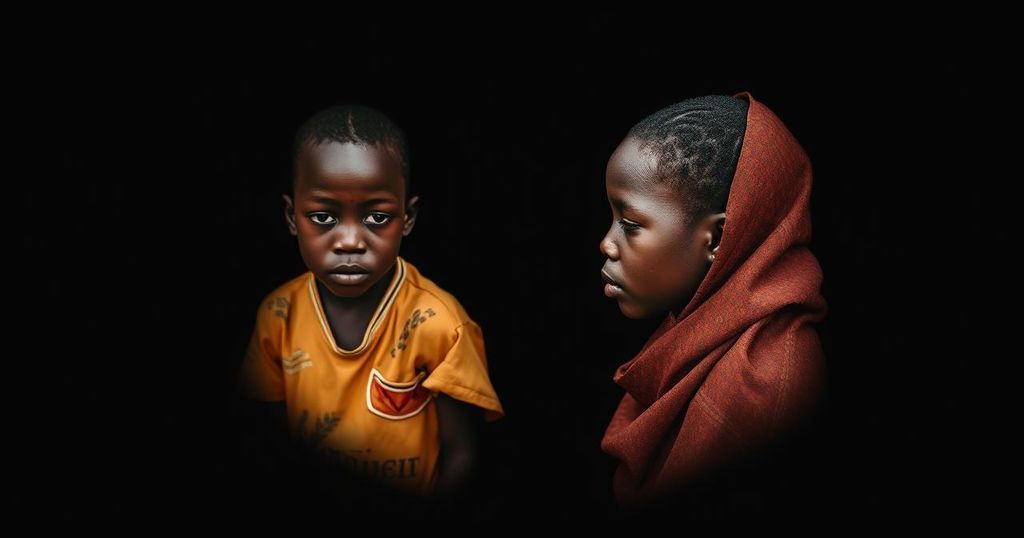Amina, a mother in the Kaya refugee camp in South Sudan, mourns her son Ahmed, a victim of violence in Sudan’s ongoing conflict. The war has created a dire humanitarian crisis, displacing nearly 5 million children and increasing malnutrition rates. Over half of Sudan’s population faces acute hunger, while education is severely disrupted. Reports of child exploitation and severe rights violations are alarmingly high. Urgent international aid is required to prevent the loss of an entire generation of children in Sudan.
Amina, a mother of five, has been engulfed by grief since the death of her 17-year-old son, Ahmed, who was killed amidst the violence that erupted in Sudan’s southeastern town of Sinja. The tragic loss occurred during an escape attempt in April, as gunfire forced the family to flee. “They shot him in the chest,” Amina recounted sorrowfully from the Kaya refugee camp in South Sudan, where she now resides with her surviving children. Ahmed’s body was buried hastily in a shallow grave before they continued their perilous journey to safety. As conflicts in the Middle East and Ukraine dominate global focus, a profound humanitarian crisis unfolds in Sudan, severely impacting the most vulnerable: children. Since the onset of armed conflict, nearly 5 million children have been displaced, with thousands resembling Ahmed losing their lives. For those fortunate enough to survive, the future is grim. Daily, refugees recount their harrowing experiences in South Sudanese camps, revealing the extensive humanitarian toll. Famine is exacerbating the suffering, with devastating malnutrition levels among children. Millions lack access to education and healthcare, while many endure sexual violence, exploitation, and forced recruitment by armed groups. Aid agencies are constrained by insufficient foreign aid and dangerous conditions, leading to dire predictions for Sudan’s youth. “Children’s lives in Sudan have been utterly torn apart and changed forever… A generation isn’t yet lost – but without help, it may well be,” articulated Mohamed Abdiladif, interim Country Director for Save the Children in Sudan. The conflict, sparked in April 2022, arose from tensions surrounding civilian governance following the ousting of long-time leader Omar Al-Bashir in 2019. Despite various mediation efforts, violence escalated, especially in regions like Darfur. The United Nations reports that around 15,000 fatalities are recorded in Darfur alone, with millions displaced and seeking refuge in neighboring countries, including Chad, Egypt, and South Sudan. Human rights organizations cite rampant abuses on both sides, including allegations of ethnic cleansing by the Rapid Support Forces (RSF) in Darfur. Compounding this, the conflict has induced a food crisis, with over half of Sudan’s population experiencing acute hunger. The UN anticipates that 730,000 children may suffer from severe malnutrition due to the situation. In Maban, South Sudan, aid workers observe alarming signs of malnutrition among new refugees. Harrowing scenes unfold in local healthcare facilities, where malnourished children, like 11-month-old Muna, are treated. Her grandmother lamented, “Her mother didn’t have enough to eat… I hope she will get better, but when I take her back to the camp, what will I give her? We have nothing to eat.” Malnutrition threatens children’s long-term health, as it compromises their immune systems and can exacerbate non-lethal conditions. Furthermore, education has been severely disrupted, with over 90% of Sudan’s school-age children unable to access formal education. Schools have been repurposed for military use or shelter for displaced families. For adolescents like Amir, a former computer science student, the impact of war is particularly disheartening as aspirations crumble in the face of adversity. “The war has taken so much from us. My future has been stolen,” he lamented. Child recruitment remains a grave concern. Reports indicate that more than 1,700 violations of children’s rights occurred in 2023 alone, including killings, recruitment, and sexual violence. South Sudanese authorities acknowledge the pressures related to child protection and seek additional support to counteract these dire circumstances. Humanitarian organizations are actively calling for a cessation of hostilities and improved access to vulnerable groups, alongside increased funding to mitigate the ongoing crisis. The UN has issued an appeal for $2.7 billion, though only half has been fulfilled. Abdiladif, of Save the Children, highlighted the innate resilience of children, emphasizing the importance of timely and appropriate support to help these youth flourish. Urgent international assistance is paramount to avert potentially irreversible damage to a generation of Sudanese children, whose lives have been dramatically altered by the ongoing conflict.
The ongoing conflict in Sudan poses a severe threat to the country’s children, exacerbating an already critical humanitarian crisis. Since hostilities began 18 months ago, millions of children have been displaced, with many not only losing their homes but also suffering from extreme malnutrition, lack of education, healthcare, and enduring violence. The war has roots in political power struggles, following the ousting of long-term rule, which have since spiraled into widespread violence and humanitarian distress. Aid organizations struggling to respond face significant limitations, including funding shortages, dangerous conditions for staff, and the sheer scale of needs among displaced populations.
The brutal conflict in Sudan continues to threaten the lives and futures of countless children, who are facing malnutrition, loss of family, and the struggle for basic needs. Years of upheaval have led to a staggering displacement crisis, where urgent international assistance is necessary to address the needs of this vulnerable population. Without immediate and sustained support, a generation of children could be irretrievably lost, with tragic consequences for individual lives and broader societal stability.
Original Source: www.middleeastmonitor.com







